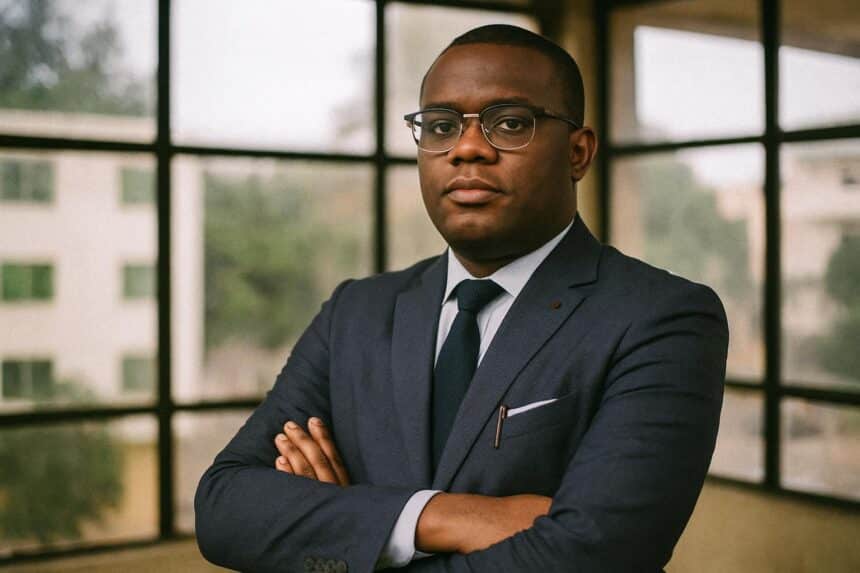From Saint-Pierre Claver to the Bench
When Murphy Fred Viclaire Miékountima Sémo steps into the vast courtroom at the Brazzaville High Court, it is hard to guess he is only thirty-two. Robe neatly pressed, tablet under his arm, the young judge embodies a generation born with keyboards.
His journey from Bacongo’s classrooms to the bench has followed the traditional stages of Congolese legal studies, yet with a digital twist at every stop. Friends recall him debugging computers between lectures, arguing that law and code would soon speak the same language.
Discovering the Power of Code
The switch flipped decisively during a cybercrime workshop he attended in his third university year. A visiting expert demonstrated how a single phishing email could empty public accounts. “I understood that sovereignty also lives in servers,” Sémo remembers, eyes lighting up behind thin spectacles.
From that day he doubled his coursework with online certificates in network security and programming. Tutors sometimes scolded him for typing during lectures, unaware he was writing scripts to simulate court evidence chains. The university dean eventually encouraged the side passion, sensing future need.
A Voice in the Fight against Cybercrime
Appointed to the TGI of Brazzaville in 2020, Sémo immediately asked to join the chamber that handles digital offences. Dossiers ranged from defamation on social networks to sophisticated crypto-currency scams. Colleagues say his capacity to translate technical jargon into plain French eased deliberations significantly.
He also pushed for evidence screens in court, arguing that jurists must see the metadata behind each post or transaction. The proposal, modest in cost, cut hearing times by hours. “Fighting cybercrime begins with showing judges the crime scene,” he often tells trainees.
Training Congo’s Next Digital Defenders
Since 2022, those trainees include future police officers at the National Police College. Every fortnight Sémo exchanges the robe for a projector, guiding cadets through case studies that start on a smartphone and end in the Code pénal. Attendance has jumped, according to administrators.
Captain Clarisse Nzaba, who coordinates the module, values the pragmatism. “He never demonises the internet; he shows us where the breadcrumbs hide,” she says. Her promotion caught a darknet dealer last month by tracing crypto wallets, a method lifted directly from Sémo’s coursework.
Publishing a Roadmap for Modern Courts
Academic recognition followed. His thesis, defended at ENAM, dissected 120 local judgments and mapped their digital blind spots. L’Harmattan quickly offered to publish the expanded text, now titled The Judge and Cybercrime in Congo, a slender yet dense volume already quoted in seminars.
The book argues that magistrates should master at least basic coding principles, not to replace technical experts but to ask the right questions. Reviewers praised the balanced tone, noting the absence of alarmism. “Technology must serve fairness, not fear,” the author insists during signings.
A Vision of Sovereignty and Humanity
Beyond the library shelves, Sémo chairs the National Network of Congolese Magistrates in AI and Cybersecurity, a fledgling association already counting sixty members. Monthly webinars dissect cases from Lagos to Libreville, comparing how different statutes tackle identical botnets. Collaboration, he says, is the best firewall.
His schedule will tighten further with a research stay split between Canada and the University of Reading in 2024-2025. The programme focuses on cross-border evidence transfer, a topic crucial for Congo’s plan to harmonise with African Union standards. Funding comes partly from Commonwealth scholarships.
While abroad, he promises to remain accessible on encrypted channels, continuing to mentor colleagues facing novel malware at home. His office already runs a voluntary hotline for judges who receive USB sticks as exhibits; within minutes a team checks for hidden exploits before hearings.
Officials in the Ministry of Justice watch the experiment with interest. A senior adviser confirms that pilots inspired by Sémo’s suggestions, including secure cloud archives for rulings, are under consideration. Observers note the alignment with President Denis Sassou Nguesso’s broader digital transformation agenda.
Economic actors equally benefit. Banks struggling with online fraud value magistrates who understand blockchain ledgers, reducing the risk of freezing legitimate assets. Regional telecoms welcome quicker injunctions to take down malicious sites. Each success story, Sémo believes, reinforces public trust in both justice and connectivity.
Asked whether algorithms could one day pass judgment themselves, he laughs softly. “An equation lacks compassion,” he says, quoting his grandfather, a retired village chief. In his view, the future lies in augmented decision-making: machines handle volume, humans weigh context, dignity and mercy.
From courtroom to campus, Murphy Sémo’s itinerary paints a portrait of a country taking its digital destiny seriously. “Modernisation is patriotism,” he repeats in every keynote. For the young magistrate, the verdict is clear: technology, wisely used, can only strengthen Congo’s justice.
His target is an e-filing system allowing citizens to lodge claims online without leaving rural districts, a project he hopes will launch during his fellowship, bridging geography as well as technology.






















